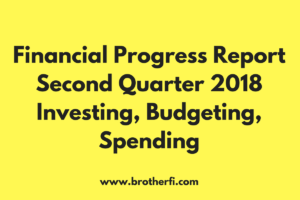Listen on iTunes. Listen on Google. Listen on Stitcher.
Millennials listen up, especially broke millennials. And if you were born between 1982-2002 you might qualify as a millennial, depends on who you ask really. As part of this elite group of IKEA enthusiasts, video game experts and fancy doughnut connoisseurs I think it’s time we finally put an end to the stupid financial choices we keep making. Thanks to an education system that doesn’t prepare you for the real, “real world,” more millennials than ever are struggling with debt, financing way too expensive cars and neglecting to save for the future.
There are so many issues to address on financial independence for the millennial generation, but I think I will reserve all the details for a book in the future maybe. Right now I’d like to address 10 money choices that any millennial can benefit from. As broke millennials you have the advantage to learn from those older than you. Be wise and pay attention.
1. Stop ignoring your budget
One of the least exciting choices you can make with money is budget it. One of the most responsible choices you can make with money is budget it. Budgeting helps you take control of your finances. The earlier in life you learn this, the more financially successful you’ll be. Don’t think you’re the exception. Every tower of wealth is built with a budget as part of the foundation. Visit my budget page for free tools to help you get started.
2. Don’t try to outspend other broke millennials
This idea of trying to outshine one another is a big reason why there are so many broke millennials. You must shift the focus from spending to saving. I challenge young people to encourage each other to save and invest for the future rather than spend and waste in the present. Surround yourself with a community of people who aren’t worried about what name you’re wearing or driving. Keep friends who are making wise choices with their money. Be careful to follow money advice of those who yell “YOLO” before spending all their money in one night.
3. Stop spending more than you make
I’m not against buying stuff, but I am not ok with spending money on “wants” before “needs” and having no money at the end of each month. This is why budgeting is really important, because you can watch your spending before it happens. Before you make a purchase consider how much money you actually have and make a smart money choice that won’t leave you struggling to pay your bills. This includes how much you pay for rent, groceries, subscriptions including Amazon Prime and Netflix. Make sure your monthly expenses are much lower than what you make.
4. Don’t delay investing
If you don’t already know by now, you should be investing in some sort of tax-advantage account. I really like Roth IRAs for any young investor. If you’re not sure where to begin, low-cost Index Fund investing is a great way to start an investment portfolio. The key is to get this part of your wealth building going as early possible. Historical data shows that an investor who saved $100/month in the S&P 500 in any of the 40-year periods between 1928 and 2014 would have about $973,000. This is why you get started as early as possible and stick with it for the long haul. Compound interest is a powerful phenomenon that will either work for you or against you. It’s your choice.
5. Avoid financing a car
One of the biggest lessons I’ve learned with money is to pay cash. It doesn’t matter if you get a really low-interest rate with zero money down. My advice will always be to avoid car payments. First, you don’t need an expensive car to get you wherever you need to go. Secondly, you’ll be paying so much money that you could otherwise be saving and investing for your future. Having a paid off car is awesome and I’ll never go back to financing again.
6. Stay away from student loans
One of the greatest challenges broke millennials face is the student loan problem. I remember as I was beginning my second year of college and walking into the financial aid office with a need to figure out how to pay for the upcoming semester. I did not know what taking student loans really meant for me long-term. Really, what 18 or 19-year-old do you know fully understands the full scope of debt and interest rates? I still take full responsibility and thankfully today have no student loan payment! This was all due to the debt snowball method, hard work and sacrifice. I would like to think the education on student loans has gotten better, but statistics seems to prove otherwise with the national student debt amount ever increasing.
7. Avoid credit cards or at least until you’re 25
This tip could be a little controversial. Personally, I’ve stopped using credit cards all together for about a year. We still keep my wife’s credit card open, but only to use for work related expenses. I’ve experienced the positives and negatives of having credit cards and I just cannot condone the use of a credit card no matter what. Of course the marketing and advertising of credit cards are such big businesses you’re bound to come across a very tasty offer that you can’t deny. My advice is to run! Run away from credit cards and never sign up for one. And if you feel that you absolutely have to have one, be careful. Credit cards are dangerous and if not properly and responsibly used can be damaging to your goal of financial independence. Studies show we don’t actually make good decisions until we’re 25 so if you want to wait till then you could save yourself a lot of headache.
8. Seriously consider life insurance
If you have a spouse and/or children this is a no brainer. When you have life insurance you protect those you love for the what-if-worst-case-scenario. Life insurance is a tool that gives you the peace of mind while on your path to financial independence. For millennials I really can’t recommend any product other than term life insurance. It’s cheap and can hold you down while you save, invest and accumulate more assets in your financial portfolio until you basically become self-insured. At that point having other types of insurance like umbrella insurance will be useful. Even if you don’t have family to support you can always get life insurance to provide for an organization or non-profit in the event you are no longer here.
9. Keep track of your net worth
One of my favorite financial activities is to keep track of my net worth, meaning how much I have in assets (what I own) minus how much I have in liabilities (what I owe). This one thing you do can help you become more aware of your current financial situation and fix it. Seeing my net worth go from negative to positive was such a huge motivator that I believe you will enjoy doing this task of tracking your net worth as well. I use Personal Capital to keep track of my net worth and highly recommend it to you too. It’s a very simple online based tool that you can use to list all your assets and liabilities to see how you’re doing. There’s also Excel/Google sheet templates out there in case you don’t like having your information in a website.
10. Stop making excuses
With the exception of a very few, the vast majority of us broke millennials have no reason why we can’t win financially. Taking a few actions early on in life will propel you towards an awesome future. You have the resources and ability to change your situation for the better. Between the internet and the library you have every bit of information out there to be successful at no cost to you, except you time.
There are so many individuals who have come out of broken communities and difficult upbringings to show us all we can achieve greatness and financial independence. You need to realize that you can do this and it starts with you believing in yourself and referring to these 10 tips that can help you. My final message to broke millennials: stop making excuses and start making progress.



